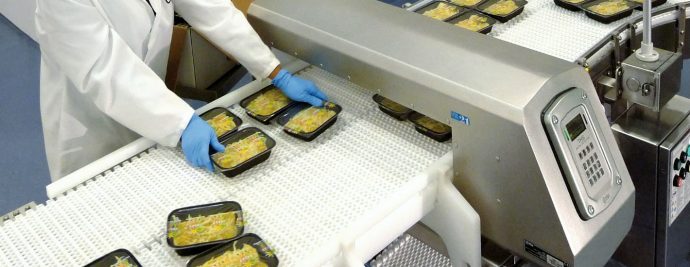There are undoubtedly many uses for metal detection technology. Current applications range from food production to security to pharmaceutical. In truth, there are few industries that aren’t touched by the benefits of metal detection technology – technology that, day in and day out, saves lives.
image source: here
Metal Detectors in the Food Industry
In the food manufacturing industry, metal detectors are deployed as a means to protect the end consumer. Whether it be from the raw materials or the manufacturing process itself, both ferrous (magnetic) and non-ferrous metals (not magnetic) can find their way into the assembly line. Since even minuscule amounts can be harmful to consume, regulatory bodies like the Food and Drug Administration (FDA) takes swift action against food manufacturers who don’t take the proper precautions.
It should be noted that even the most efficient process cannot completely exclude metallic particles from entering the manufacturing process; a reality that makes the inclusion of metal detection technology all the more necessary.
With that knowledge in mind, the challenges that manufacturers face time and again isn’t whether to incorporate metal detection technology at critical control points of the production line, but rather how many to use and where. Fortunately, industrial metal detector manufacturers design their products in such a way as to make their insertion into the manufacturing process relatively easily from a logistical point of view.
Metal Detectors Used in Construction
When considering the many applications of an industrial grade metal detector, many people tend to overlook the construction industry. Like other industries, using a metal detectors in construction adds efficiency and safety. For example, metal detectors are often used to detect the presence of non-visual metal components prior to drilling. Metal detectors are also used under water to locate cabling or pipes that require preventative maintenance.
In terms of building materials, the wood used in the construction of homes and other projects can come from a number of sources, either natural or recycled. While perhaps more useful for the latter, large, custom metal detectors scan the wood in order to locate large fragments of metal that could damage cutting equipment either at the lumber yard, the job site, or in the DIYer’s garage. Damaged equipment aside, a saw blade operating at speed coming into contact with a metallic fragment could also pose a significant danger to the one doing the cutting.
Metal Detectors as a Form of Security (airports, courthouses, government buildings, schools)
One of the most commonly known uses for metal detection technology is associated with maintaining security. Unfortunately, there are many dangers still present in the world. Some locations, like airports, schools, courthouses (and more), are viewed as potential targets of the kinds of attacks designed to harm the maximum number of people possible.
Unlike those used in the production of consumables, metal detectors intended to promote security are easily identifiable by the public. Configurations used in airports and government buildings for example, tend to resemble an empty doorway, or archway and require individuals to pass through. These detectors typically use pulse induction technology via two large coils placed in either side of the arch. These coils generate a series of pulses (up to 1000 per second depending on the manufacturer and the model), each of which generates a magnetic field. If a metallic object passes through the field, its own magnetic field can be detected by the device’s receiver.
Metal Detectors Used in the Production of Pharmaceuticals
Like the food industry, pharmaceutical manufacturers must ensure their products are completely contaminant free prior to leaving the facility. Metallic compounds found in a pill or capsule can of course, be harmful to the consumer if it’s large enough to lacerate the esophagus or intestine, but metal in life saving drugs can be harmful in another way. For example, some metals can reduce the effectiveness of certain medications which in turn could result in a patient’s care to be inexplicably compromised. Contamination can come in a number of forms, to be sure, but the creation of some tablets or capsules actually require a metallic component to be added during the production process to act as a catalyst. This catalyst must be removed before the end of production, and metal detectors help manufacturers to qualitatively assess the purity of their medications before they are consumed.
All of these reasons and more adequately extol the need for metal detectors in a wide range of industries, but there’s one more reason to use industrial metal detectors that in no way impacts end user health and safety. Metal detectors are also needed to protect the machinery used in the manufacturing process. Depending on the machine, even the smallest metallic contamination can damage or render non-functioning a piece of vital equipment. If exposed, costly repairs and significant downtime may result – both of which can negatively impact a company’s bottom line. Strategically placed metal detectors at crucial points prior to these machines can prevent this type of damage by identifying contaminated product before it’s too late.

